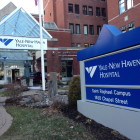Fines & Sanctions
Medicare Penalizes 26 CT Hospitals For High Readmission Rates
|
Twenty-six Connecticut hospitals will lose some of their Medicare reimbursement payments over the next year as penalties for having too many readmitted patients, new data from the Centers for Medicare and Medicaid Services (CMS) show. Nationally, Medicare is reducing payments to 2,499 hospitals, about 47% of all facilities, with the average penalty being 0.64%, according to a report by Kaiser Health News (KHN). This year’s penalties were based on tracking patients from July 1, 2017 through Dec. 1, 2019, so the influx of patient care during the pandemic is not included, CMS said. In Connecticut, 72 % of all hospitals in the program will face a loss in CMS payments, beginning October 2021 through September 2022.






